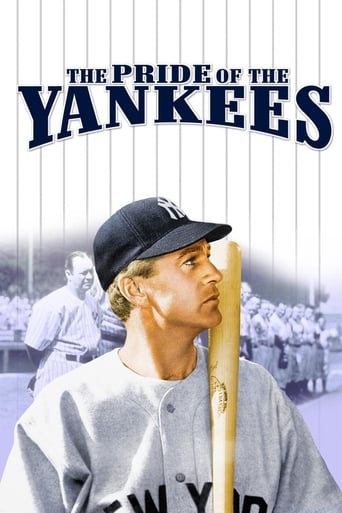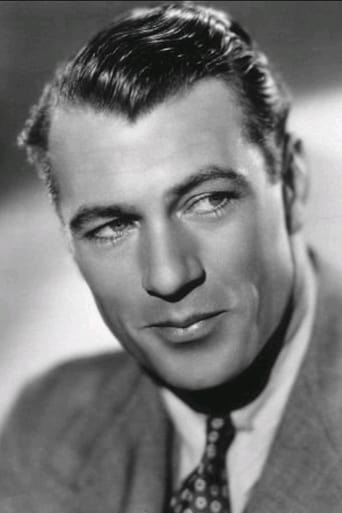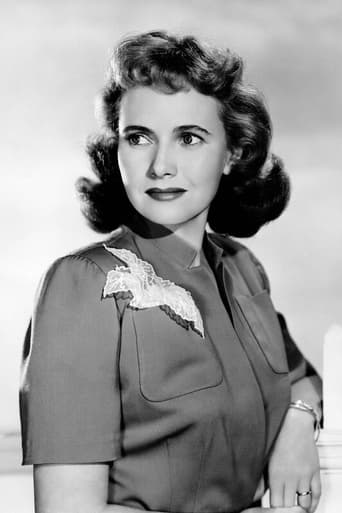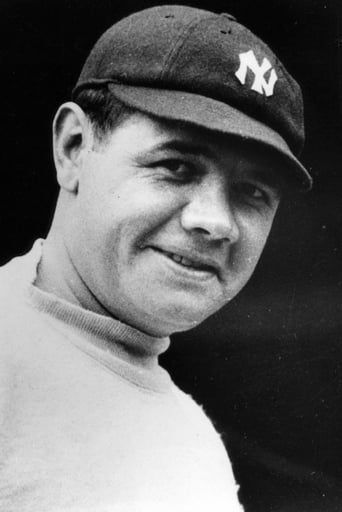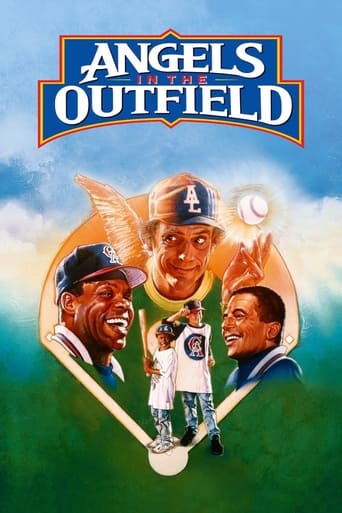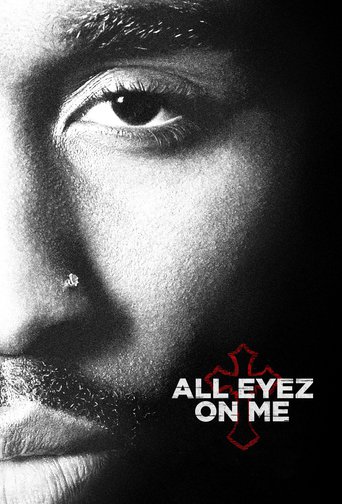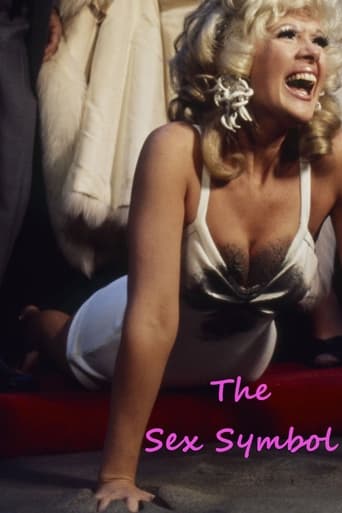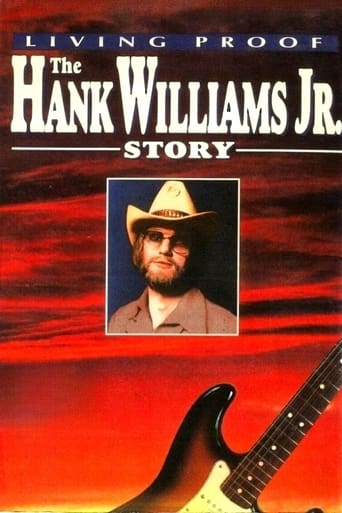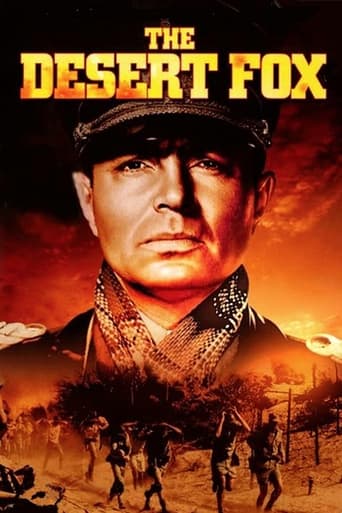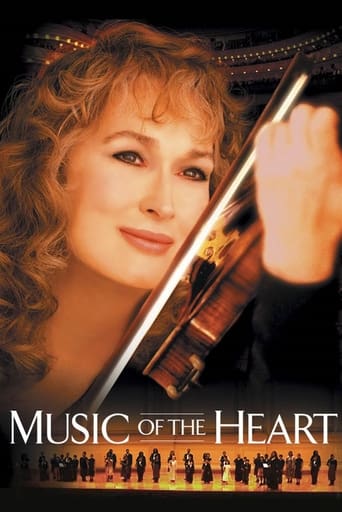The Pride of the Yankees (1942)
The story of the life and career of the baseball hall of famer, Lou Gehrig.
Watch Trailer
Cast
Similar titles
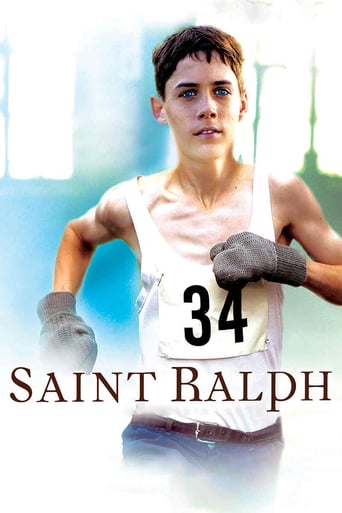
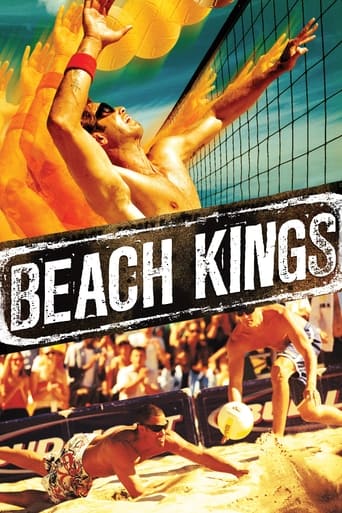

Reviews
The Age of Commercialism
Good concept, poorly executed.
Great movie! If you want to be entertained and have a few good laughs, see this movie. The music is also very good,
The film creates a perfect balance between action and depth of basic needs, in the midst of an infertile atmosphere.
Use your calculator and figure out when Gary Cooper played the Lou Gherig role in this 1942 film. Mr. Cooper was born in 1901, so when he played this role, he was already an over 40 years old middle aged guy, yet according to what we have seen in this film and BIOS of Gherig, he indeed attended Columbia University. So he would be a very young man as most of us normally graduated from high school at 18 and then enter the university for advanced education. But what we saw in the movie, an already over 40's guy, Gary Cooper, played a college student who should and would be under 22. So the supposed to be still a very young Ghrig played by Cooper appeared on the screen to serve the food for those Columbia students, what we saw was an 40-year old guy! And well, in order to allow the middle aged Cooper not showing too old among those Columbia undergraduates, those young students were also played by a bunch of over 30 or around 40s guys, just for the purpose not to make Cooper's middle aged face became so apparently old like a sore thumb! Gee, what a joke!When Cooper entered the kitchen of the university, the female actor who played Ghrig's mother, after 10 years when her son broke the store's window, she looked exactly the same as 10 years ago when the movie started. Gee, what a lousy arrangement we got here again. According to Ghrig's BIOS, "...A native of New York City and attendee of Columbia University, Gehrig signed with the Yankees in 1923.....Lou Gehrig died at his home on June 2, 1941 from amyotrophic lateral sclerosis (ALS)" So according to Ghrig's death year and the release of this particular film about him, we inevitably realized that Samuel Goldwyn Company just took the opportunity to shoot a picture about a guy just died, on the surface, the movie was paying tribute to the great late Ghrig, but under and behind the facade, the Jewish movie company just used the rare opportunity to cash in, and indeed, not only the box office successful, but also won a lot of Oscars. But to me, this film was just opportunist wet dream played by a bunch of wrong cast of the wrong ages. By all means, do not be so easily to be touched and fooled. When you watched those movies churned out around that period, we often saw some very old guys, especially Gary Cooper, Randolph Scott, John Wayne and lot of other older faces, played much much younger characters and young lovers, but the wrinkles on their faces just screamed off the silver screen, they were just a bunch eye-sore old Romeos forced to play those young roles by those movie companies in Hollywood. You have to lower your reasoning to accept those roles played by these old bunch. I can't give any star of this film, because I really don't like really old guys to play those characters who should be 20 years younger.
THE PRIDE OF THE YANKEES (Samuel Goldwyn/RKO Radio, 1942), directed by Sam Wood, taken from the opening credits underscoring to "Take Me Out to the Ball Game," could very well be a historical account about the New York Yankees. Instead, according to the opening tribute by journalist Damon Runyon, "its the story of Lou Gehrig." (Born Henry Louis Gehrig (1903-1941), one of the greatest baseball players of all time). An original story by Paul Gallico details Lou Gehrig's life, first starting him as a boy (Douglas Croft) of twelve in New York City. He's introduced as a son of German immigrants whose father (Ludwig Stossel) is a janitor and mother (Elsa Janssen), a cook at Columbia University whose ambition is for her son to grow up like their Uncle Otto to become an engineer. Even at an early age, Lou's talent for baseball is proved effective as he bats with the neighborhood kids hitting the ball to a point of smashing a store window at a very far distance, costing his mother to come up with $18.50 to replace it. As a young man working his way through school as a waiter, studying to become an engineer, Lou (Gary Cooper), a baseball athlete for Columbia University, is discovered by sportswriter, Sam Blake (Walter Brennan), who eventually signs him as player for the New York Yankees. Though Mama Gehrig is very much against this, her son's newfound success turns her into a baseball fan. After slipping on a pile of baseball bats in his first game in Chicago, Lou is teasingly called "tanglefoot" by pretty spectator, Eleanor Twitchell (Teresa Wright) seated by her father (Pierre Watkin). Following a brief courtship, they would soon marry. As time progresses with Blake and Hank Hannerman (Dan Duryea) watching and reporting first baseman Gehrig making baseball history from the press box, "The Iron Man" as he would be called, would not only rank along with Babe Ruth (Babe Ruth) as one of the greatest sports figures, but become a true pride of the Yankees. All this would change after Lou faces something that would put an end to his powerful sixteen year career.In one of the finest sports movies ever made, THE PRIDE OF THE YANKEES, became producer Samuel Goldwyn's only biographical film, and one of his most admired. Gary Cooper, having already won his Academy Award as Best Actor playing SERGEANT YORK (Warner Brothers, 1941), an American war hero, gets another home run here by the Academy once again for his portrayal of an American sports hero, Lou Gehrig. Being more of a personal and private life story of Lou Gehrig than on his development as a baseball player, it's all wonderfully told during its 128 minutes. Though historians may find several faults of mention, including a scene or two where Cooper writes or bats right handed rather than Gehrig's oft-mentioned left, or placing few factual characters in the wrong time frame, the acting, the story and direction make up for such errors. With time away from some Yankee game re-enactment, there's time out for humorous moments by Babe Ruth and his baseball buddies, musical entertainment featuring a tango dance from the Moon Terrace Cabaret performed by Veloz an Yolanda as conducted by Ray Noble and his Orchestra. There's also female vocalist on platform singing the classic Irving Berlin tune, "Always," that to become the Gehrig's personal love songAside from Teresa Wright's sensitive portrayal during its second half, and Walter Brennan, sporting glasses and mustache, as the sports writing friend, no scene comes close to Cooper's heartfelt closing speech on that historic Tuesday, July 4th, 1939, day at Yankee Stadium that would not only stay in memory long after the film is over, but prove his Lou Gehrig to be "the luckiest man on the face of the earth."Even if THE PRIDE OF THE YANKEES strays from the truth at times, it's every sports buff's dream to actually get to see such baseball legends of the past portraying themselves, Bill Dickey, Mark Koenig and Robert Meusel. There's no one more recognizable than Babe Ruth at bat on the field, taking part in the story as well. Aside from Ruth having appeared in several motion pictures dating back to the silent era, it's little known fact that Gehrig appeared in a feature length motion picture himself, interestingly a "B" western titled RAWHIDE (20th-Fox, 1938) starring Smith Ballew, (Who?), a bit of trivia not included in the film. Aside from the major actors, others participants worth noting are Virginia Gilmore (Myra Tinsley); Ernie Adams (Miller Huggins), Hardie Albright (Van Tuyl), and sports announcer Bill Stern appearing as himself.THE PRIDE OF THE YANKEES, having been a long time movie favorite on New York City's Yankee station of WPIX TV, Channel 11 (1970-1995), has in later years been shown in the colorized format. Distributed to home video and later DVD, it's cable TV history consists of American Movie Classics (1992-1998) and Turner Classic Movies (TCM premiere: March 30, 2003), and few others. Nominated for Academy Awards: Best Actor (Cooper); Best Actress (Wright); and Best Picture, the legend of Lou Gehrig rests mostly on this motion picture retelling, not for just a while, not for just a day, not for just a year, but always. (****).
Gary Cooper plays New York Yankees star first baseman Lou Gehrig, whose career and life were cut short by a disease that now carries Gehrig's name. Cooper gives a great performance (everyone thinks he won the Oscar for this _ he didn't, he took home the gold for "Sergeant York, and again for "High Noon"") and appearances by real-life ballplayers (pictured: Cooper with Babe Ruth, Gehrig's former teammate, during filming) give the picture a feel of authenticity. A minor quibble that it romanticizes Gehrig's life is not without merit, but the film should be allowed to venture into American mythology, like the sport itself. Cooper's rendition of Gehrig's moving "the luckiest man on the face of the earth" speech is, in itself, worth the price of admission. A classic on every level.
Of course, I would never say that The Pride Of The Yankees was the worst movie ever made about the sport of Baseball, but, then again, I'd definitely never admit that it was the best, either.Yes. I do fully realize (much to my dismay) that this 1942 picture was clearly intended to be MGM's respectful homage to honour one of baseball's greatest and beloved stars, Lou Gehrig (who sadly died only one year before this film's release) - But, the thing is, I personally think that the revered memory of an idolized man like Gehrig certainly deserved so much better than the likes of this less-than-satisfying "rush job".One of this film's biggest and most detrimental deficits was the casting of one of Hollywood's dreariest and utterly non-charismatic actors of the 30s & 40s, Gary Cooper.Not only was Cooper (at 42) way too old for the part of playing a man 15 years his junior, but I also found Cooper to be such a totally forgettable non-entity in his part as Gehrig that it teetered on the very edge of being downright insulting and disrespectful.Gary Cooper clearly didn't have the capacity to bring any reasonable depth or life to his floundering character. He just played his usual bumbling, "aw-shucks" self, and, believe me, it was actually pathetic to watch at times.This film also suffered from sentimentality-overload, 1940's style. And, yes, again, I do realize that this film was intended to be a loving tribute to Gehrig (who I have nothing against), but, all of this schmaltzy sentimentality made him out to be a literal saint (who could swing a mean bat) and whose feet never once seemed to touch the ground.Besides what I've already beefed about above - This film (with its gruelling 2 hour and 10 minute running time) contained not a single surprise. In fact, it often tripped over itself when it came to the likes of predictability.The final blow that forced me to reduce this picture's overall rating even lower was the unnecessary focus paid to the portrayal of Lou's mother, played by the scenery-chewing actress, Elsa Janssen. This opinionated woman was insufferably overbearing.As it appeared in this film, Gehrig was apparently so completely devoted to his mother that he was reduced to the point of being a frickin' "momma's boy". Even after Lou moved away from home and had gotten married, he still remained absolutely ruled by mommy-dearest's demands and the vicious strangle-hold of her apron strings.As you can well-imagine, this intense focus on Lou's screwy attachment to his mother (which carried right through to the end of the story) grated on my nerves, big-time.Perhaps after seeing this film for yourself, you will find your opinion of it to be much less harsh than mine. But, I just want to say that I did not hate this movie. I just thought that since it was meant to honour a sports hero of Gehrig's magnitude, then it certainly could've been a helluva lot more entertaining and enlightening in regards to presenting Gehrig as a real person (warts & all) and not just as the product of some cheap, Hollywood white-washing job.
